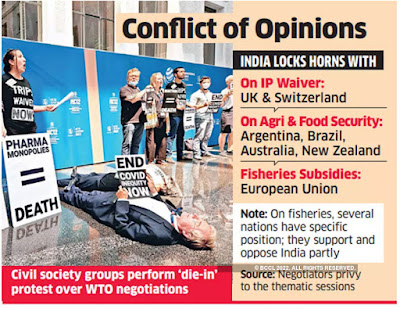WTO using wrong yardsticks for Global Welfare and Climate Change
WTO using the wrong yardsticks for Global Welfare and Climate Change
By
Vijay SARDANA
Advocate, Supreme Court of India
Techno-legal Expert in Trade Matters
The purpose of any multilateral treaty is global welfare.
The WTO member countries are using trade volumes and money as yardsticks for welfare in place of the number of people involved in the economic activity and their welfare.
Where developed nations world is wrong in their argument?
The western world, led by OECD members, does not want to accept any argument which can reduce their dominance in any international forum. The single point of their argument is to retain their economic and political dominance on the world stage.

Let me share a few live examples.
Covid vaccine for profit but does not support a cap on prices: When the world is suffering from the Covid, the Western world wants to exploit the disease for commercial gains by blocking IPR so that more vaccines can be developed. Western companies are making illogical demands to supply their vaccines to the developing world and waiver from any liability when it comes to the quality and efficacy of the vaccines for which they are demanding a premium. At the same time, they are blocking Indian vaccines in various global forums and markets by spreading misinformation. The justification is focused on single-point agenda of how to maximize profits at the cost of the life of people. Western companies are selling the most expensive drugs to the global market by inflating the cost in the name of research. There must be a forensic audit on every research project to know the facts.
Manmade Energy Crisis for profit but does not support a cap on prices: First OECD nations place economic sanctions on oil-producing nations like Iran, Venezuela, and Russia in the name of Human Rights but leave people to suffer in Afghanistan at the hands of terrorists. Then demand the rest of the world to reduce customs duty and open their markets so that western trading companies can exploit global resources to their benefit.
Global Food Security for profit but does not support a cap on subsidy in OECD nations: When millions of people suffer from hunger, the OECD nation wants governments to stop buying food and feed the needy. They want only private trade should be allowed to feed the nations that too at inflated prices by cartelization.
Agreement on Fisheries for profit but does not support a cap on over-exploitation by OECD countries: Now they want small fishers and anglers should stop fishing for livelihood, and only large boats with permission should go for exploitation. OECD nations in the name of the environment want to exploit the global resources for their benefit including the exclusive economic zones of other nations.
What is the way forward?
WTO was created for the welfare of people and the environment.
The unit of welfare is people, not GDP and not trade percentage or profits.
If all human beings are at par and have equal rights that case, to ensure a level playing field and equal and fair growth opportunity all calculations for every country in the global policy environment must be based on per capita. This will tell who is exploring and who polluting the world's resources more than required. This should include subsidy per capita, fishing catch per capita, emission per capita, food waste per capita, Carbon footprint per capita, etc. Any other parameter will only ensure deferential treatment between human beings of the various countries by OECD members. Any differential treatment is against the universal declaration for Human Rights.
Suggestions are:
1. All parameters must be based on per capita utilization or spending.
2. Per capita parameters must be the same for all. There should not be any benefit or concession for the people who are exploiting more than required per capita. They should be forced to reduce their intake to save the environment. For example, if any society is consuming more plastic or more fuel consumption than global sustainability norms, that society or country should be asked to reduce its intake, whereas societies consuming less than global sustainability norms should be allowed to decide what they must do for the welfare of their people.
3. Similarly, subsidies must be on a per capita basis not the GDP logic. To ensure fairness, there can be some adjustments due to PPP and geographical hardships. If the exploiters have more GDP does not mean they have the right to exploit more. Example: India has argued that its fisheries subsidy at $15 per family per year to ensure livelihood, was not even comparable to what developed nations dole out, for example, $42,000 by the Netherlands, $65,000 by Sweden and $75,000 by Denmark. This catch is traded globally for a profit, not for self-consumption. OECD countries want India to reduce subsidies. Is this logical?
The fact is OECD members do not want developing nations to progress, this will hurt their political and economic dominance over global affairs.
Please do share your comments and views on the same.


Comments
Post a Comment